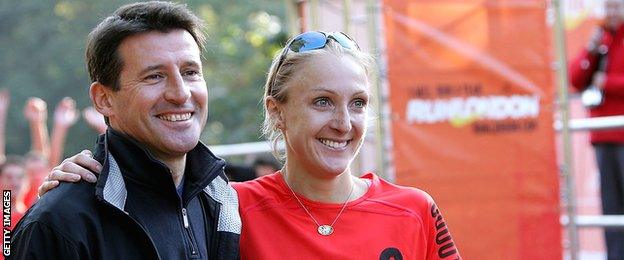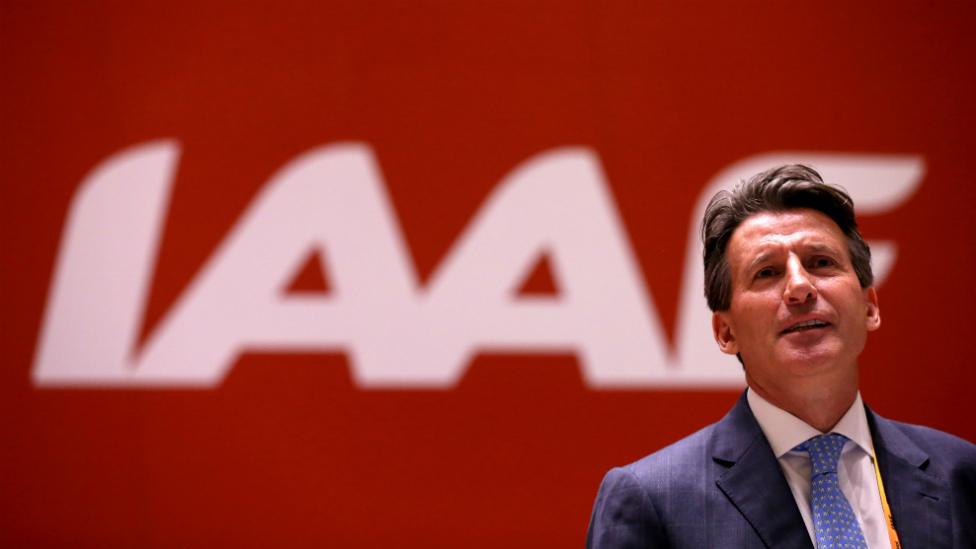Paula Radcliffe says athletes should not release blood data
- Published
Paula Radcliffe: I was a clean athlete
Three-time London Marathon winner Paula Radcliffe has backed the anti-doping agencies in advising athletes not to make their blood data public.
In an interview with BBC sports editor Dan Roan, the 41-year-old Briton said the information is complicated and can be misunderstood and misinterpreted.
She also said she was proud of her career and had always been clean.
"The whole point is you go through your career, you look back and say, 'That was the best I could do,'" she said.
"If you take a short cut, you can't say that. You can't look yourself in the mirror and say that was the absolute best you were capable of."
Pavey: Why I'm releasing blood test data
With accusations of doping casting a shadow over the build-up to the World Championships in Beijing, European 10,000m champion Jo Pavey has chosen to publish her blood-test data to show she is a "clean athlete", while double Olympic champion Mo Farah has also released his in a bid to prove he is not a cheat.
The pair's stance contrasts with the advice of the World Anti-Doping Agency (Wada) in making the data public, and Radcliffe agrees with the authorities.
"The key point is you can't prove you are clean," she said. "We don't have a foolproof, 100% testing programme in place right now so we can't prove that. In some sense, what Wada are trying to say is we don't want this data out there in the public domain because people don't understand it, it is very complicated.
"Something like the blood passport has taken a long, long time to get to a position where it can be properly interpreted by proper experts and used. It is not a test you can fail, that is important to stress. It is a tool that is used to guide more targeted testing and then can be built up to a point where the experts agree, it can be an accurate pointer to blood testing.
Paula Radcliffe's career | |
|---|---|
Won London Marathon in 2002, 2003 and 2005 | European 10,000m champion in 2002 |
Marathon world record holder (two hours 15 minutes 25 seconds) | Commonwealth 5,000m gold medallist in 2002 |
Won World Championship marathon gold in 2005 | BBC Sports Personality of the Year in 2002 |
"I think if you put too much of that information in the public domain you risk doing a lot of things, you risk it being misunderstood and misinterpreted, you also risk putting information into the hands of people who are trying to cheat that system and who then are going to learn the information of how to manipulate and how to make sure they stay within this perfect zone and that is not what we want or what it was ever designed to do."
Radcliffe, who will be part of the BBC team covering the World Championships from 22-30 August, added: "We all want to do whatever we can to show we are clean.
"The sad thing is there is nothing in place at the moment that allows us to do that. That is why it is really important what you believe in and what you stand for because that, at the moment, is the strongest thing."
Radcliffe, who set the world record of two hours 15 minutes 25 seconds in London in 2003, is regarded as the greatest female marathon runner in history.
She ran the London Marathon competitively for the last time last year, less than three years after surgery on a serious foot injury.

Radcliffe has previously said that she would love to work with new IAAF president Lord Coe
She said: "People have said to me, 'Do you regret running that time because it is three minutes faster than other people, it is looked on with suspicion?' No I don't because the whole point of my career was to see what I could do. I wanted to get to the end and say that was the best I was capable of doing.
"That wasn't good enough to get me an Olympic medal but it was very much all hard work and the work of the whole team around me that went in to me being able to run that, so I am proud of it. I don't regret that at all.
"One thing I have learnt is you can't control what people are going think or say. You can only know within yourself, and the people who matter to you, what they believe.
"There has never been any question of that, so it is something I am very proud of and I know I can teach the moral beliefs and ethics I have to my children and be proud of that and want them to be able to look back and learn from that."
- Published19 August 2015

- Published10 September 2015

- Published8 February 2019
